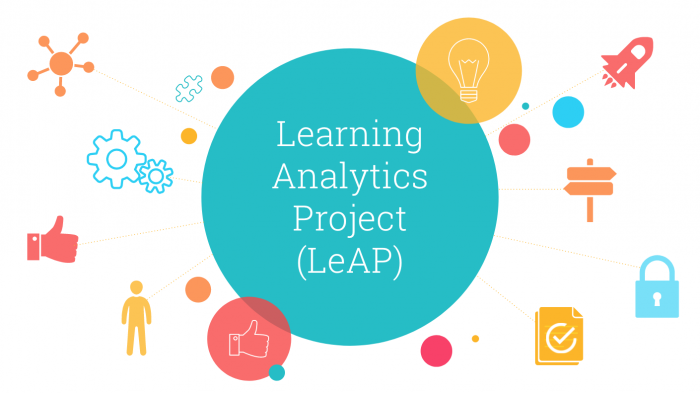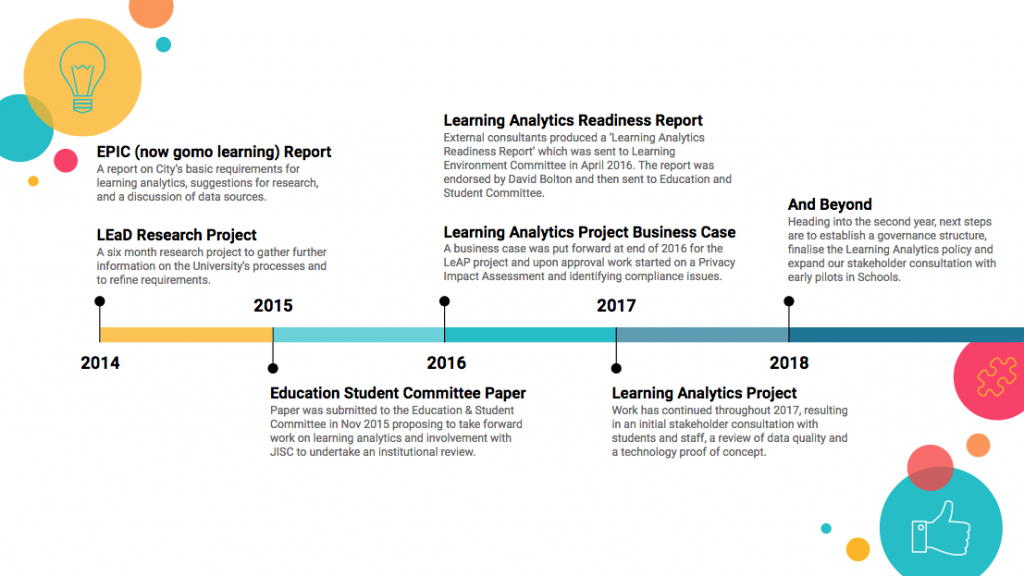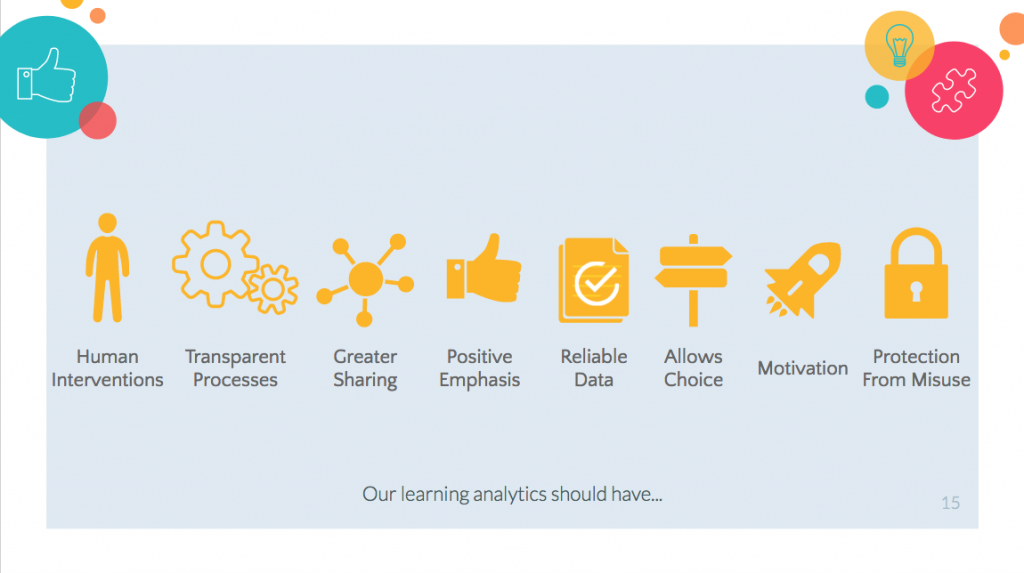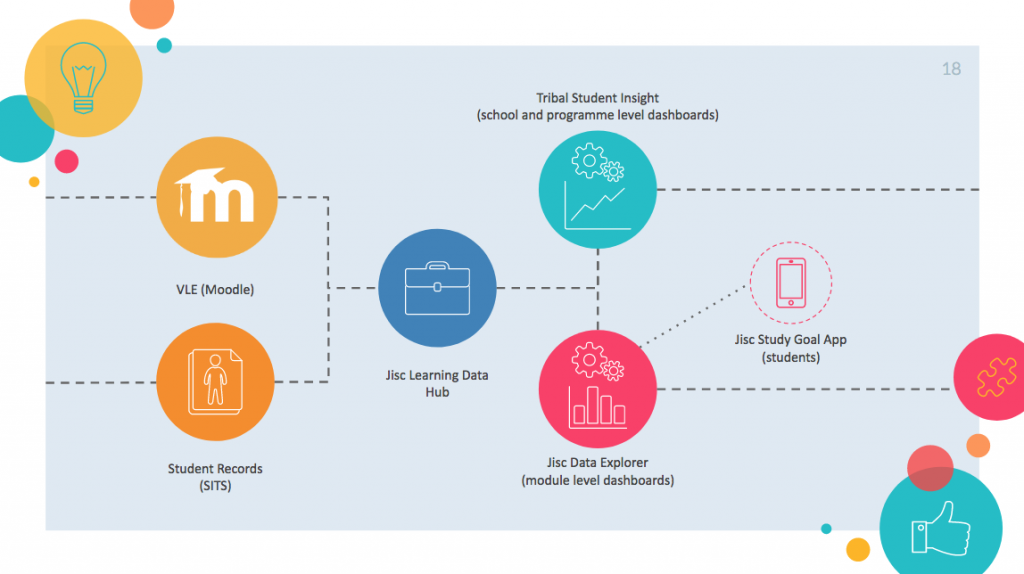Learning Analytics is a hot topic across the higher education sector. If you are a regular Learning at City blog reader you may have spotted Natalia Czuba’s recent report sharing research findings presented during October’s Critical Learning Analytics Seminar, organised by the Society for Research in Higher Education (SRHE).
Last week, the Learning Analytic Project (LeAP) team showcased our latest developments to colleagues from Information Technology (IT), Library and Learning Enhancement and Development (LEaD). City’s Mike Hughes (IT), Leona Norris and Jo Richardson (LEaD), members of the LeAP project team, discussed their Learning Analytics journey with staff. City staff were also joined in the audience by representatives from Taylor University (USA), who were visiting London and our campus.
Contents
Maximising the potential of all City’s students
Out of 22 Jisc Learning Analytics Pathfinder projects, City is one of only five forerunning institutions to have a predictive algorithm based on three years of historical data. The project’s aim is to maximise the potential of all our students, improving their educational experience, whilst supporting the institution’s education performance indicators relating to progression and attainment.
Learning analytics uses data about students and their activities to help institutions understand and improve educational processes, as well as provide better support to learners. For City, this means it should be for the benefit of students – whether assisting them individually; using aggregated and anonymised data to help other students; or to improve the educational experience more generally.
The Learning Analytics process
Running over three years, the project will pilot and implement third-party systems to bring together dispersed data into a single ‘data warehouse’ and provide tools for analysis in order to produce actionable insights and information. These can then be acted on to improve the student’s educational experience across three levels of stakeholder groups:
- Students are supplied with actionable information about their own learning to help them to identify areas of strength and weakness. They can then choose to access appropriate support mechanisms and guidance to maximise achievement of their learning outcomes and potentially exceed the ‘predicted’ outcome.
- Module leaders and personal tutors are given information about how students are engaging with their courses, so they can offer the right support when it’s needed;
- Programme directors are given information around student retention and progression across their programmes, so they can gain strategic insights to inform and develop support approaches.
A brief history of Learning Analytics at City
The project is born out of many years of collaboration between colleagues in IT, LEaD and SaAS.
Timeline of Learning Analytics at City
The above timeline shows our progress since the first exploration in 2014 with an external agency report on City’s basic learning analytics requirements, generating suggestions for research, and a discussion of data sources. The work continued with research run by LEaD to gather further information on the University’s processes and to refine requirements. Findings from both activities formed a paper submitted to the Education and Student Committee in November 2015 proposing to take learning analytics forward and undertake an institutional review with Jisc.
This produced a ‘Learning Analytics Readiness Report’ which was sent to the Learning Environment Committee in April 2016 and then endorsed by Professor David Bolton for the Education and Student Committee. Finally, a business case was put forward at the end of 2016 for the LeAP project and, upon approval, work started on a Privacy Impact Assessment and identifying compliance issues.
Requirements from initial student and staff consultation
Work has continued throughout 2017, resulting in an initial stakeholder consultation with students and staff, a review of data quality and a technology proof of concept. This has also been supported by many collaborative meetings with the technology providers Jisc and Tribal, as well as other Higher Education pathfinder members and the wider Jisc Learning Analytics Network.
Current state of play and beyond
There are two sources of data currently stored in the Jisc Learning Data Hub: student records (SITS) and the Virtual Learning Environment (Moodle). The Data Hub contains three years’ worth of historical data, that has been used to train the predictive model, and receives a regular feed of live data.
Basic system diagram of City’s Learning Analytics system
The project is now looking to pilot two platforms (Jisc Data Explorer and Tribal Student Insight) for displaying student, module and programme data including engagement, traffic light indicators and predictive analytics.
Heading into the second year of the project, the next steps are to establish a governance structure, finalise the Learning Analytics policy and expand our stakeholder consultation with early pilots in Schools.
Synergies with other institutional projects
LeAP has connections and interdependencies with other projects taking place across the University, in particular Modernising Administration for Students (MAfS) and General Data Protection Regulation (GDPR) work. LEaD, IT and Student and Academic Services are working together closely to ensure that requirements and objectives across all areas are included.
Want to know more?
Sponsored by Professor Susannah Quinsee, Professor of Learning and Teaching Development and Director of LEaD and Professor Jo Wood, Professor of Visual Analytics in SMCSE, the project team is made of representatives from LEaD, IT and Student and Academic Services (SaAS).
To find out more about City’s Learning Analytics Project (LeAP), check out the project website: http://bit.ly/CityLeAP
Leona Norris and Tatiana Dias
Learning, Enhancement and Development (LEaD)
December 2017





